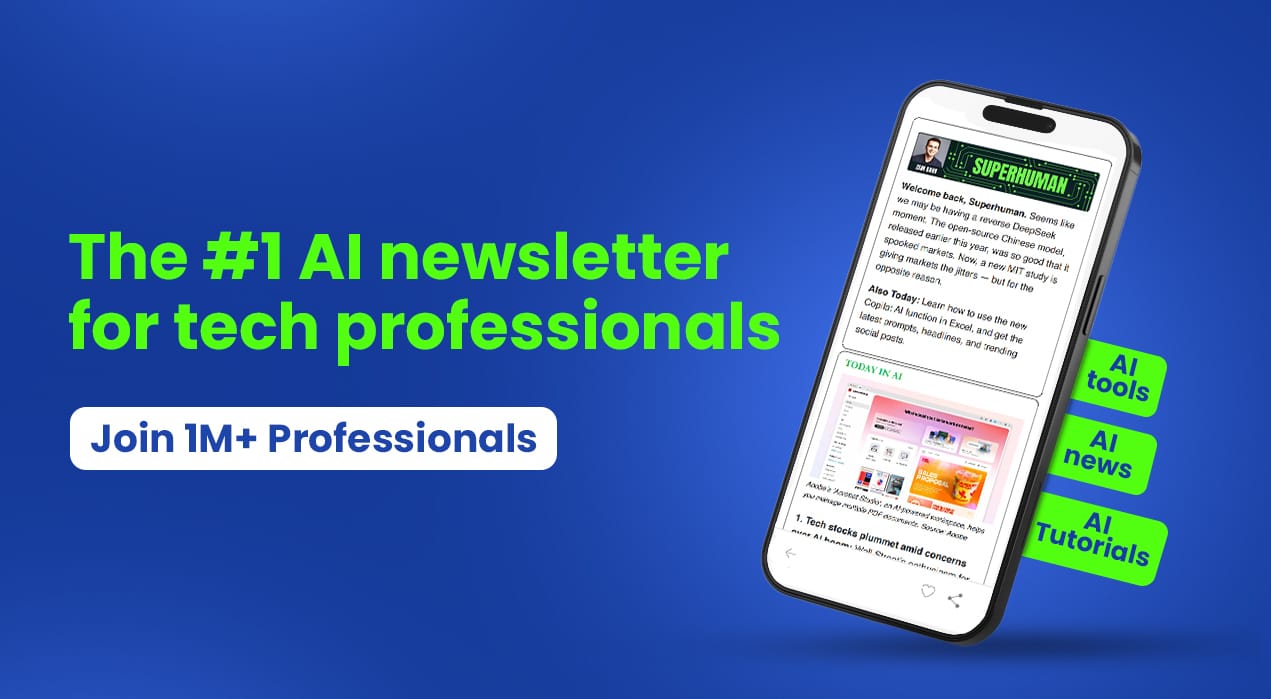- Generative AI Art
- Posts
- Apple's universal translator for AirPods
Apple's universal translator for AirPods
PLUS: The web's new wall against AI scrapers and the 'AI babysitter' problem
Apple has unveiled a new real-time translation feature for its AirPods, turning them into a personal interpreter that operates completely offline. The new capability is powered by Apple Intelligence and processes everything directly on the user's device.
While the feature requires the latest iPhone and can create a one-sided conversation, it marks a major push for on-device AI. Is Apple's privacy-first approach enough to set a new standard in a field where competitors have been for years?
Today in AI:
Apple’s on-device translator for AirPods
The rise of the ‘AI babysitter’ in coding
Google’s new privacy-focused language model
PRESENTED BY SUPERHUMAN AI
Become the go-to AI expert in 30 days
AI keeps coming up at work, but you still don't get it?
That's exactly why 1M+ professionals working at Google, Meta, and OpenAI read Superhuman AI daily.
Here's what you get:
Daily AI news that matters for your career - Filtered from 1000s of sources so you know what affects your industry.
Step-by-step tutorials you can use immediately - Real prompts and workflows that solve actual business problems.
New AI tools tested and reviewed - We try everything to deliver tools that drive real results.
All in just 3 minutes a day
What’s new? Apple rolled out a new real-time translation feature for AirPods, turning them into a personal translator that works entirely offline, right on your device.
What matters?
The feature is powered by Apple Intelligence and runs completely on-device for privacy, but requires an iPhone 15 Pro or newer to work.
Unless both people have compatible AirPods, the experience is one-sided; you hear the translation, but the other person must read your response from your iPhone's screen.
Apple enters a space where others have been for years; Google's Pixel Buds have offered a similar feature since 2017 and recently expanded to support over 70 languages.
Why it matters?
Processing language on-device is a major step forward for making personal AI more private and accessible without needing an internet connection. This signals a future where personal devices handle complex tasks independently, pushing powerful AI capabilities directly into users' hands.
PROMPT STATION
What’s new? While AI coding assistants are rapidly being adopted, a new report finds that senior engineers now spend significant time acting as “AI babysitters” to fix buggy code, but they say the productivity boost is still worth the effort.
What matters?
A recent study from Fastly found that over 95% of developers spend extra time correcting AI-generated code, with senior staff shouldering most of the verification workload.
This AI-generated output often introduces bugs, inefficient design, and security risks, leading to the rise of new roles like the “vibe code cleanup specialist.”
Despite the added review time, senior developers are twice as likely to ship AI-generated code into production compared to their junior counterparts, citing major gains in overall speed and efficiency.
Why it matters?
This trend signals a fundamental shift in the developer's role from a pure coder to a curator and supervisor of AI output. This human-in-the-loop workflow is quickly becoming the new standard for building products at scale.
PRESENTED BY AI REPORT
Used by Execs at Google and OpenAI
Join 400,000+ professionals who rely on The AI Report to work smarter with AI.
Delivered daily, it breaks down tools, prompts, and real use cases—so you can implement AI without wasting time.
If they’re reading it, why aren’t you?
What’s new? Google has released VaultGemma, the first large, open language model trained with a mathematical privacy guarantee to prevent leaking sensitive training data.
What matters?
It's trained with differential privacy, a method that provides a mathematical guarantee it won't memorize or reveal specific information it was trained on.
As an open model, developers can immediately access and build with VaultGemma, which is available on Hugging Face.
This release directly addresses one of AI's biggest challenges: preventing the model from exposing the private or personal data included in its training set.
Why it matters?
This development allows organizations to build with powerful open models while minimizing the risk of leaking sensitive information. It sets a new benchmark for creating privacy-conscious AI that can be widely and safely deployed.
Everything else in AI
Mercor received offers valuing it at $10B for its AI marketplace that connects domain experts with companies like OpenAI and Meta for data training.
Otto Aerospace unveiled the Phantom 3500, a business jet designed using AI that achieved a 35% drag reduction and targets 60% less fuel usage than its competitors.
Hippocratic AI partnered with University Hospitals to deploy conversational AI agents for non-diagnostic tasks like providing medication support and patient engagement.
Reflection AI neared a funding deal that would value the Nvidia-backed startup, founded by former Google Gemini engineers, at $5.5B.
Essential AI Guides - Reading List:
Let us know!
What did you think of today's email?Before you go, please give your feedback to help us improve the content for you! |
Work with us
Reach 100k+ engaged Tech Professionals, Engineers, Managers and decision makers. Join brands like MorningBrew, HubSpot, Prezi, Nike, Ahref, Roku, 1440, Superhuman, and others in showcasing your product to our audience. Get in touch now →



